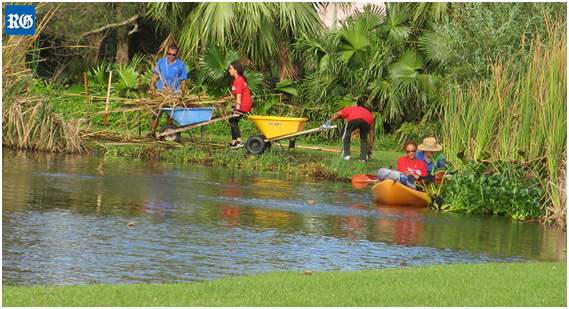Recent News
Tour de Turtles Race beginsThursday, August 15, 2013
Two juvenile green sea turtles are being tracked by scientists as part of the Tour de Turtles Race on the Rock.
Looking after turtles — Island hosts international course
Thursday, August 15, 2013
The Bermuda Zoological Society is hosting an international course on the biology and conservation of sea turtles.
Dolphin leaves Somerset waters, heads to sea
Wednesday, August 14, 2013
After swimming around super close to shore in Somerset, the dolphin that caused a stir on Monday [Aug 12] has returned to the deeper waters and has not been spotted close to shore since
Warning as children swim with wild dolphin in Somerset (Update)
Wednesday, August 14, 2013
A dolphin that appears to be stranded near Somerset Long Bay has been in the area all day.
Lone dolphin leaves Somerset Long Bay area
Wednesday, August 14, 2013
A dolphin feared stranded in Somerset Long Bay has left the area.
About
GovernanceAbout Us
Newsletter
Latest News
Gift & Bookstore
Contact
General Inquiries
info@bzs.bm
Latest News
All the latest updates and news from the Bermuda Aquarium, Museum, and Zoo, one of Bermuda's leading visitor attractions!
Jonathan Bell
Published Jan 16, 2018 at 8:00 am (Updated Jan 16, 2018 at 6:41 am)

HSBC volunteers help a Bermuda Zoological society team clean up
Cloverdale Pond in Smith's (Photograph supplied)
Two ponds have been cleaned up courtesy of an island conservation programme.
Cloverdale Pond in Smith’s and Southampton’s Evan’s Pond, a refuge for endangered species, were improved through the Bermuda Zoological Society’s wetlands remediation programme.
The scheme, which became the HSBC global water programme for Bermuda in 2014, was designed to remove toxic petroleum compounds from ponds.
The build-up of the poisonous hydrocarbons is a threat to the island’s two endemic killifish species, as well as native diamondback terrapins, which are a protected species.
The compounds, which come from oil, water runoff and vehicle exhausts, can be broken down by bacteria when the pond sediments are aerated.
The two-year grant from HSBC allowed the proposal to be tested in the field.
Volunteers also took part, with help from the Department of Environment and Natural Resources.
The BZS said Cloverdale was chosen first because of its small size, its “known severe effects on wildlife” and the absence of protected species in the water.
Evan’s Pond was selected as the second test site because of its small population of killifish.
The ponds were divided into sections and aerated for six to eight hours a day with solar powered compressors.
Hydrocarbon levels saw a major reduction over the course of a year.
The next site for remediation is the South Pond at the Mid Ocean golf course, where the hatching of diamondback terrapins has been hampered by pollution.


